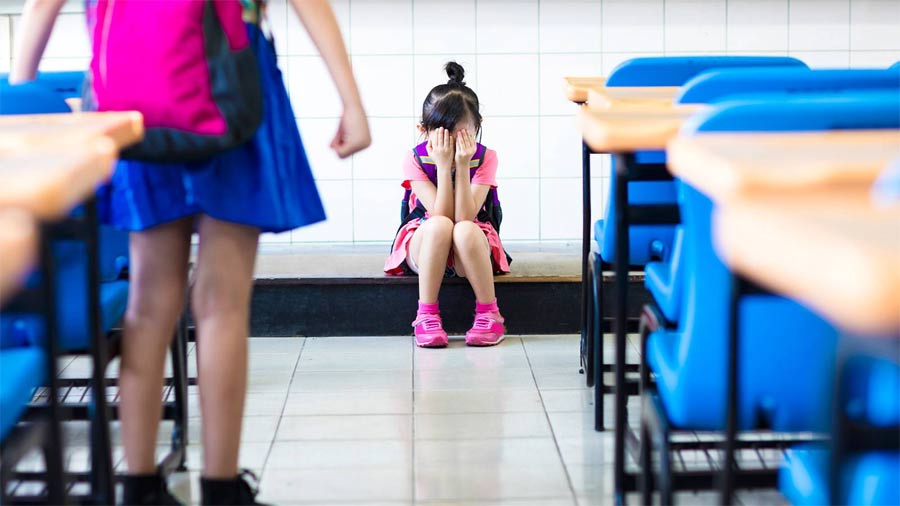Signs of bad friendships
It's okay if you don't love all of your child's friends. It's okay to have friends who aren't exactly your type, and it's important to let your child explore different types of friendships. But sometimes your child will have a friend who isn't just unpleasant, or even toxic or negative.

If your child has a toxic friend, you may be wondering what to do, whether to intervene, and how. Here are the signs of a toxic friendship, including how to talk to your child about it, when to seek help, and more.
How Experts Define a Toxic Friend
You may be wondering exactly what a toxic friend is. Emily Zeller, LMFT, a licensed marriage and family therapist and founder of Zeller & Co. Therapy, describes a toxic friend as someone who ' consistently behaves in ways that drain, manipulate, or harm your child—emotionally, socially, or even physically .'
Additionally, according to Zeller, toxic friendships include specific unhealthy behavior patterns. These behaviors can include:
- Constant negativity, including putting your child down, mocking them in some way, or making them feel bad about themselves
- Controlling or possessive, such as dictating who your child can talk to, or getting unreasonably angry when they spend time with other people
- Drama and manipulation, which may include guilt-tripping, spreading rumors, or giving "tests" to prove loyalty.
- Favoritism, like always receiving but never giving back
- Peer pressure, including encouragement of risky behaviors (drug use, truancy, or bullying others)

Signs Your Child Is in a Toxic Friendship
It's not always easy to recognize when your child is in a toxic friendship. Often, children don't have the vocabulary or awareness to fully understand what they're going through.
' Children can't always articulate 'this relationship doesn't seem right,' but their behavior and mood will tell you everything ,' explains Cheryl Groskopf, LMFT, LPCC, an anxiety, trauma, and substance abuse therapist in Los Angeles.
So what are the signs that your child might be in a toxic friendship? If your child starts acting differently than usual—like being quieter, more 'angry,' or seemingly withdrawing from people they once trusted—that's a sign that something's not right, says Groskopf.
It can also be helpful to observe your child after playing with a friend who is considered toxic. Groskopf advises: ' Watch how your child behaves after playing with this friend. Is he exhausted? Irritable? Sad? Those emotional changes are data. '
How to talk to your child about toxic friends
It can be hard for young children to recognize a toxic friendship, and it can be difficult for them to talk about what's going on. When that happens, Groskopf advises against getting too emotional. " As tempting as it is, this is not the time to become a full parent and start badmouthing the friend ," she advises. " That will only push your child closer to them ."
Instead, Groskopf advises parents to be "curious." She suggests asking questions like, " Do you feel safe being yourself around them? " or " What happens if you disagree — can you speak up? "
You can also ask your child how he or she feels physically around the person. " The goal isn't to label the person — it's to help your child listen to his or her own internal alarm system ," Groskopf describes.

What should parents do if their child doesn't see the friendship as toxic?
Chances are, despite gentle reminders, your child still doesn't realize how toxic his friendship is. What should you do in that situation?
Instead of labeling your friend as "bad," you can try these approaches with your child, Zeller says:
- Ask open-ended questions, such as: " How do you feel when you're around him? "
- Encourage your child to be self-aware and help him or her recognize signs of something unusual; you might say something like, "I noticed you seemed really sad after hanging out with that friend. Have you ever felt that way? "
- Model healthy relationships, such as demonstrating respect, trust, and mutual concern in friendships.
- Support your child's autonomy - instead of asking your child to cut ties with a toxic friend, guide them in setting healthy boundaries.
- Resist the urge to cut off the friendship completely ; this often backfires and makes your child defensive.
You should read it
- ★ These stt or talk about betrayal in friendship
- ★ 11 differences between sincere friends and fake friends you should know
- ★ Top 11 reasons why we are getting a little bit more
- ★ True strange story: Hippopotamus and orphan rhino have wonderful friendship in the reserve
- ★ 13 wonderful quotes about love to 'define' a true friendship